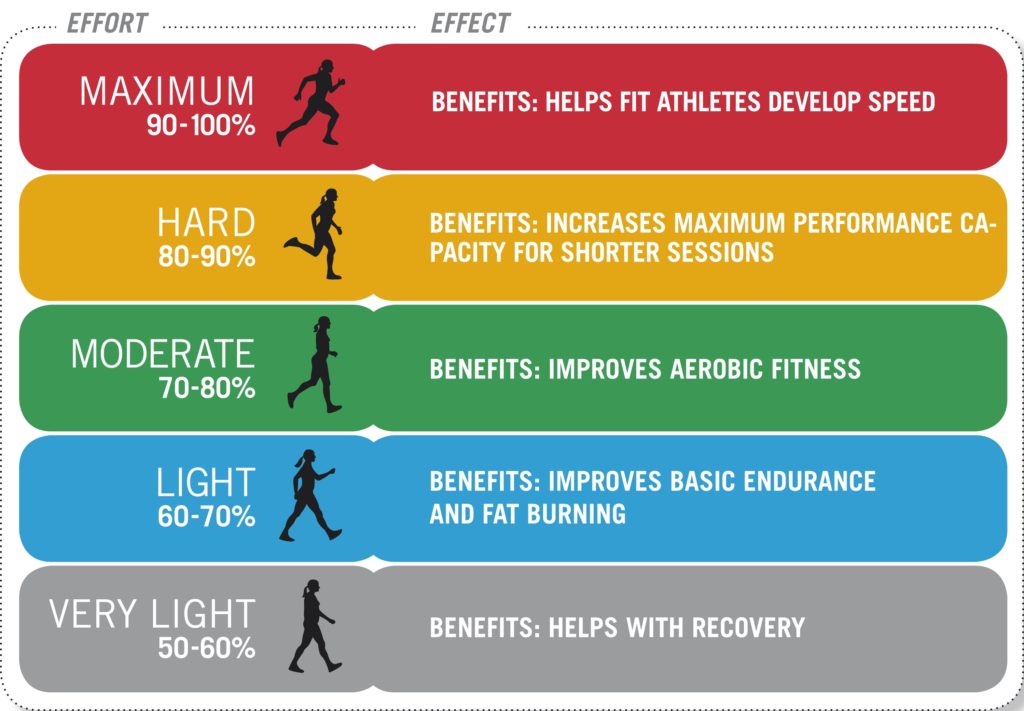How Healthy Is Your Heart Rate?
How Exercise Affects Your Heart
The heart is a muscle which becomes more efficient with exercise. When you exercise, your muscles help to circulate blood through the body taking some of the strain and effort off the heart. So, not as much work is needed to pump blood and the heart becomes stronger over a period of time. That’s why your heart rate health is important!
As you begin to exercise, your heart will contract faster and circulation will increase, which gets oxygenated blood to your muscles quicker. As the demand for blood increases, the heart will try to meet the demand in two ways: by increasing the heart rate and also by increasing the force at which it contracts. The increase in oxygen delivery is twofold: your heart will pump more beats per minute, and will more forcefully contract each time it beats so a greater amount of blood is pumped throughout the body.
So What Is A Healthy Heart Rate?
Your heart rate is one of the best indicators of how hard your body is working, whether at rest or during exercise.
Unlike a purely subjective evaluation of intensity, your heart rate is a number you can measure, just like frequency and duration.
WHAT ARE HEART RATE ZONES?
We all have a personal resting heart rate, “a minimum heart rate”, and a maximum heart rate. And between these values are different heart rate zones that correspond to training intensity and training benefit.
There are different ways to specify your heart rate zones. One simple way is to define them as percentages of your maximum heart rate, and that’s what we’ll focus on in this introduction.
Heart rate zones are closely linked to your aerobic and anaerobic thresholds.
It’s great to train all zones on a regular basis, but each zone will have a different cadence.
THE FIVE ZONES of a HEALTHY HEART
There are five different heart rate zones, 1–5, and your training plan can (and should) include workouts in all five zones.
Below is a breakdown of what each heart rate zone means and what the benefits of training in that heart rate zone are.
HEART RATE ZONE 1: 50–60% OF HRMAX

This is the very low intensity zone. Training at this intensity will boost your recovery and get you ready to train in the higher heart rate zones.
To train at this intensity, pick a form of exercise that allows you to easily control your heart rate, such as walking or cycling.
HEART RATE ZONE 2: 60–70% OF HRMAX

Exercising in heart rate zone 2 feels light and you should be able to go on for a long time at this intensity.
This zone improves your general endurance. Your body’s ability to “oxidize” – burn – fat. Your muscular fitness will also increase along with your capillary density.
Training in heart rate zone 2 is an essential part of every exercise program. Keep at it and you’ll reap the benefits later.
HEART RATE ZONE 3: 70–80% OF HRMAX

Working out in heart rate zone 3 is especially effective for improving the efficiency of blood circulation in the heart and skeletal muscles. This is the zone in which that pesky lactic acid starts building up in your bloodstream.
Training in this HR zone will make moderate efforts easier and improve your efficiency.
HEART RATE ZONE 4: 80–90% OF HRMAX

Heart rate zone 4 is where the going gets tough. You’ll be breathing hard and working aerobically.
If you train at this intensity, you’ll improve your speed endurance. Your body will get better at using carbohydrates for energy and you’ll be able to withstand higher levels of lactic acid in your blood for longer periods of time.
HEART RATE ZONE 5: 90–100% OF HRMAX

Heart rate zone 5 is your maximum effort. Your heart, blood and respiratory systems will be working at their maximal capacity. Lactic acid will build up in your blood and after a few minutes you won’t be able to continue at this intensity.
If you’re just starting out or have only been training for a short time, you probably won’t have to train at this intensity. If you’re a professional athlete, look into incorporating interval training into your training plan for peak performance.

What Affects Heart Health?
There are certain factors affecting heart rate when exercising. Your body relies as heavily on the oxygen/fuel ratio as your car does. Much like your car’s engine, your body uses oxygen and various fuels (carbohydrates, fats, and proteins) to yield muscle energy. When this ratio is not in balance in the body, a whole series of physiological events occur.
These events can be gauged with your body’s “tachometer” — your heart rate. So, much like the automobile engine, the true efficiency of the body’s engine is dependent upon a multitude of parts working efficiently together. Your heart rate will indicate if there is any sign of trouble in your body’s engine.
A Brief List of Factors Affecting Heart Rate
These factors play a role in directly affecting heart rate when exercising:
- Emotions and anxiety can raise your heart rate! Unlike an automobile that is purely mechanical, we are not solely governed by working parts. Some days you can “feel” your way to a higher HR.
- Body Temperature: If you become too hot or too cold your body senses a thermal stress load. Blood is sent to your skin to enhance heat dissipation to cool you or increases blood flow to warm you. Apparent temperatures (which account for humidity or wind chill) above 70 degrees (F) and below 35 degrees (F) will increase your heart rate at least 2-4 beats per minute. Over 90% humidity can equal as much as a 10 beat increase in heart rate.
- The terrain. Walk or run uphill and your HR increases. Walk or run downhill and your HR decreases.
- Wind. Walking or running with the wind at your back is easy, therefore HR decreases. Walking or running into the wind is more difficult, so HR increases.
- Dehydration. As you become increasingly dehydrated during a long walk, hike, or run, your blood becomes thicker and waste products build up in bloodstream. Your heart will work harder to maintain constant cardiac output. A fluid loss of 3% of body weight increases pulse rate because of decrease in circulating blood volume.
- Diminishing glycogen stores — your muscles primary fuel source. As the fuel depletes, in order to maintain the same walking or running pace, your HR rises.
- Insufficient nutrition. HR increases.
- Insufficient sleep. HR increases.
- Insufficient recovery after a long hike, run, or other hard workout will increase HR.
- Recent illness — or — a signal of impending illness. You guessed it!
- Medication – depending upon the medication, heart rate can either decrease or increase. Be certain to ask your physician about any medication you are taking and its effects on your exercise heart rate.

